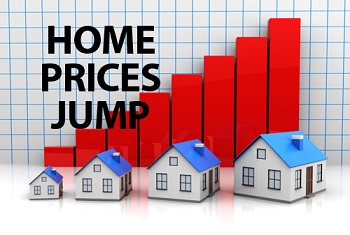By Associated Press, Published: September 24,
WASHINGTON — U.S. home prices rose 12.4 percent in July compared with a year ago, the most since February 2006. An increase in sales on a limited supply of available homes drove the gains.
The Standard &Poor’s/Case-Shiller 20-city home price index reported Tuesday improved from June, when it rose 12.1 percent from a year ago. And all 20 cities posted gains in July from the previous month and compared with a year ago.
Still, the month-over-month price gains shrank in 15 cities in July compared with the previous month, indicating prices may be peaking. And the month-over-month gains in the 20-city price index have slowed for three straight months.
Stan Humphries, chief economist for real estate data provider Zillow, said home price should continue to rise but at a slower pace. Mortgage rates have increased more than a full percentage point since May. And more homes are being built. That should ease supply constraints that have inflated prices in some markets.
“This ongoing moderation is good for the market overall,” Humphries said.
Home prices soared 27.5 percent in Las Vegas from a year earlier, the largest gain. San Francisco’s 24.8 percent jump was the second largest and the biggest yearly return for that city since March 2001.
The index covers roughly half of U.S. homes. It measures prices compared with those in January 2000 and creates a three-month moving average. The July figures are the latest available. They are not adjusted for seasonal variations, so the monthly gains reflect more buying activity over the summer.
Since bottoming out in March 2012, home prices have rebounded about 21 percent. They remain about 22 percent below the peak reached in July 2006.
The housing market has been recovering over the past year, helped by steady job growth, low mortgage rates and relatively low prices.
Sales of previously occupied homes rose in August to a seasonally adjusted 5.5 million annual pace, according to the National Association of Realtors. That’s a healthy level and the highest in more than six years.
But the realtors’ group cautioned that the August pace could represent a temporary peak. The gain reflected closings and largely occurred because many buyers rushed to lock in mortgage rates in June and July before they increased further. The Realtors said buyer traffic dropped off noticeably in August, likely reflecting the higher rates.
The average rate on a 30-year fixed mortgage was 4.5 percent last week. That’s near a two-year high. It’s still low by historical standards.
Rates rose in May after Chairman Ben Bernanke suggested the Federal Reserve could slow its bond purchase program before the end of the year.
But the Fed surprised markets last week by deciding against reducing the $85-billion-a-month in bond buys, which have kept longer-term interest rates low. The Fed said a key reason for its decision was the sharp increase in mortgage rates and other interest rates.
The Fed’s decision could ease rates temporarily, although many economists expect the Fed will ultimately slow the purchases, perhaps as early as December. Rates would likely rise after that.

